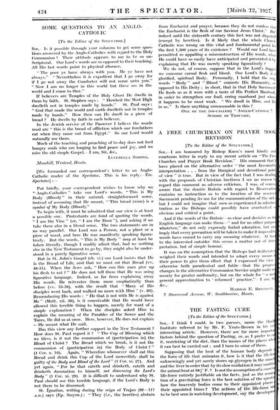A FREE CHURCHMAN ON PRAYER BOO REVISION
[To the Editor of the SPECTATOR.]
Sne,—I am honoured by Bishop. Knox's most kindly and courteous letter in reply to my recent article on "The Fn-e Churches and Prayer Book Revision." His comment that have placed on the alternative order "the most favourabi interpretation . . . from the liturgical and devotional poil of view" is true. But in view of the fact that I was -death) with the proposals of Christian brethren I see no reason t, regard this comment as adverse criticism. I was, of course aware that the drastic Rubric with regard to Reservatior contains no instruction as to the location of the reserve Sacrament pending its use for the communication of the sick but I could not imagine that men so experienced in admirri tration as the Bishops could possibly have overlooked , obvious and critical a point.
And if the words of the Rubric--as clear and decisive as It English language can make them—" and for no other parr, whate'ver," do not only expressly forbid adoration, hut aIN imply that every precaution will be taken to make it impossibl, words have ceased to carry any meaning whatever. At lea' to the interested outsider this seems a matter not of inter pretation, but of simple honour: It was on the assumption that the Bishops had deliberate weighed their words and intended to adopt every means i their power to give them effect that I expresSed the view otherwise both paradoxical and futile—that tile propose changes in the alternative Communion Service might make o merely for greater uniforniity, but on the whole for "a no general approximation to ' reformed ' practice."— -I ant, S &e., HAteoth H.- 7 Stanwood Avow, W. Southbounie, Hants.






























































 Previous page
Previous page